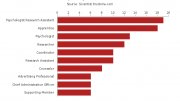 Criminal psychologists can help predict the likelihood of a criminal committing another offense.
Criminal psychologists can help predict the likelihood of a criminal committing another offense.
Stockbyte/Stockbyte/Getty Images
Criminal psychologists use their expertise in human behavior to help identify and apprehend offenders and rehabilitate convicted felons. They assess criminal behavior and diagnose psychological disorders. Some criminal psychologists investigate crimes or help lawyers select jurors for their trials. Judges and lawyers routinely call on them to testify in court or to determine a person's mental fitness to stand trial.
Clinical
Clinical criminal psychologists perform duties similar to those of nonforensic clinical psychologists. They observe their patients' behaviors and assess their mental states. They diagnose mental illnesses and do case studies. In forensics, psychologists try to find out why and, in some cases, if a person committed a crime. They might be requested to interpret a polygraph test or decide whether a parent is mentally fit to be granted child custody. They prepare and present reports on their assessments to judges, lawyers, the police and others in the criminal justice system.
Investigative
Investigative analysts, also called criminal profilers, evaluate crime scene evidence. They’re often able to provide investigators with descriptions of unidentified offenders. They use their understanding of human behavior and crime data to determine personal habits and behavior, as well as age, gender and vocation. This information helps investigators narrow their search for a suspect.
Related Reading: What Kind of Jobs Can I Get With a Criminal Justice Specializing in Psychology?
Legal
Legal criminal psychologists advise lawyers on picking the jurors best-suited for a particular trial by drawing on their understanding of personalities. They help draft questions that lawyers ask jurors during the pretrial jury-selection process. Criminal psychologists also study ways to improve methods for interrogating suspected criminals, eyewitnesses and victims. Legal forensic psychologists must know the laws relating to criminal behavior and mental health. They also must keep up to date on legislative changes.
Rehabilitative
Criminal psychologists work to help rehabilitate incarcerated and paroled offenders. They use behavior-modification therapy to help offenders return to society and avoid more prison time. They sometimes work with correctional staff to treat inmates.
Education
Criminal psychologists must earn a four-year degree. Coursework in psychology and criminal justice is helpful, but not mandatory. Psychologists, in general, need a master’s degree from an accredited school. However, most earn a Ph.D. and complete a supervised practical-training requirement, such as a residency, internship or preceptorship. States require licensing for clinical psychologists, who must have completed their doctoral studies and an internship or residency. Some states require doctoral candidates to pass an exam.
Source: work.chron.com
You might also like:

















